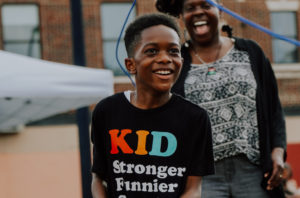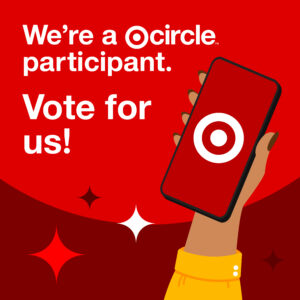Jerome Rankine for the 2017 Bush Prize
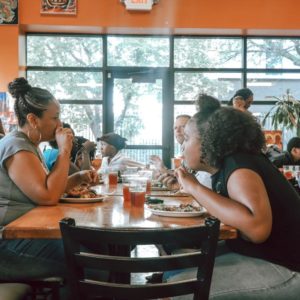 Chatter fills the room along with the clinking of utensils, the hiss of the fire, and the shuffle of tossed vegetables. There’s a rhythm to being in the kitchen. Some people cut carrots, while others shell peas and set post of salted water on the stove to boil. It’s the second Wednesday of the month, which means it’s time for Community Cooks, a hands-on workshop Appetite For Change (AFC) hosts six times a month. People from all over the Northside of Minneapolis gather in the kitchen at Breaking Bread Café to try their hand at recipes like chickpea brownies and spicy black beans with dirty rice. The setting is homey enough that it’s easy to let your guard down. Surrounded by familiar scents, it’s only natural to get comfortable and forget you’re not cooking with family.
Chatter fills the room along with the clinking of utensils, the hiss of the fire, and the shuffle of tossed vegetables. There’s a rhythm to being in the kitchen. Some people cut carrots, while others shell peas and set post of salted water on the stove to boil. It’s the second Wednesday of the month, which means it’s time for Community Cooks, a hands-on workshop Appetite For Change (AFC) hosts six times a month. People from all over the Northside of Minneapolis gather in the kitchen at Breaking Bread Café to try their hand at recipes like chickpea brownies and spicy black beans with dirty rice. The setting is homey enough that it’s easy to let your guard down. Surrounded by familiar scents, it’s only natural to get comfortable and forget you’re not cooking with family.
That’s the beauty of it. In many ways, community cooking at Breaking BRead is therapeutic—even healing. People work through recipes with someone they’ve just met, and ned up making new connections and relationships, or hearing new perspectives. “We’re missing something when we say, ‘Go pop it in the microwave,’ or ‘Grab something from the corner store,’” says Princess Haley, one of AFC’s three co-founders.
AFC’s founders—LaTasha Powell, Michelle Horovitz, and Princess—were determined to build an organization responsive to the needs of the community as they saw it, not as prescribed for them. For years, the Northside neighborhood had watched as organization after organization came into the community and told residents what needed to be fixed.
Outsiders offered solutions, but never asked for the opinions of people living here. “I didn’t want to do that,” says LaTasha, who experienced outsiders coming into her community to “help” first hand as a teenager growing up in North MInneapolis. “I didn’t want anyone to feel like what I felt like.”
In the process of launching the organization, AFC started simply by cooking with, and listening to, Northsiders—nearly 400 people attended the organization’s first eight events. While preparing guacamole or eating baked fish, AFC asked community members about what they hoped the organization would become. They asked them to describe their ideal grocery store, to list the kinds of food they wanted to see in their neighborhood and to tell stories behind their favorite meals. It was a strategy built on relationships, not judgment.
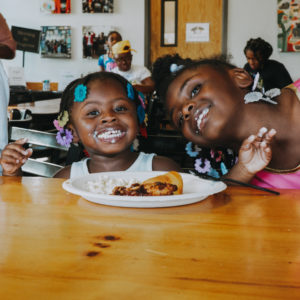 “The one thing we all hated was when we went to a meeting and someone stood in front of us and talked, and then we filled out a survey,” says Princess. For the co-founders, that approach missed the nuances of community input, and often limited participants to picking from a predetermined list of survey answers. “People don’t know all of the answers to write down as options,” says Princess, describing a more traditional approach some other organizations take. “You got the answers you wanted to get, because you gave them the choices.” To make space for a variety of thoughts, AFC went with a more open-ended format for their events, one that focused on conversation. It also videotaped the sessions and planted notetakers from the community throughout the crowd to make sure it didn’t miss a thing. Overwhelmingly, AFC learned that people loved to cook, eat, and talk together, just like they were doing at those first eight events. By 2013, AFC turned that format into the basis for its flagship program, Community Cook.
“The one thing we all hated was when we went to a meeting and someone stood in front of us and talked, and then we filled out a survey,” says Princess. For the co-founders, that approach missed the nuances of community input, and often limited participants to picking from a predetermined list of survey answers. “People don’t know all of the answers to write down as options,” says Princess, describing a more traditional approach some other organizations take. “You got the answers you wanted to get, because you gave them the choices.” To make space for a variety of thoughts, AFC went with a more open-ended format for their events, one that focused on conversation. It also videotaped the sessions and planted notetakers from the community throughout the crowd to make sure it didn’t miss a thing. Overwhelmingly, AFC learned that people loved to cook, eat, and talk together, just like they were doing at those first eight events. By 2013, AFC turned that format into the basis for its flagship program, Community Cook.
“We’re reshaping the culture of the future. Food is a tool to create health, wealth, and social change,” says Princess. “We use it to bring people together and show love. The change is individual, social, and then systemic,” says Princess.
Building Trust and Staying Power
Food options in North Minneapolis skew toward the fast and the fried, with more than 30 fast food restaurants lining the sides of the neighborhood’s main drag, West Broadway Avenue. The big box grocery in the area doesn’t follow the standard practice of putting produce as the front—instead it greets customers with day-old doughnuts, soda pop, and cinnamon bread.
LaTasha, Michelle, and Princess were fed up with the options. They wanted food that was fresh and local. They pictured robust community gardens, well-stocked farmer’s markets and food that boosted people’s health—but they didn’t want to force the community into anything it didn’t want. “We knew a lot, but we knew we didn’t know enough to just start a program or service without hearing from the voice of the community,” says Princess. But the Northside had seen its share of outsiders who wanted to take the neighborhood’s information and plop in solutions that didn’t stick, and the community had become skeptical of researchers and new initiatives. The three AFC co-founders had to demonstrate they were in for the long haul. They needed to build trust in the community, and that would take elbow grease.
To start, they got in on the ground floor, giving cooking demonstrations in front of local stores and handign out samples of the result: fresh mango salsa. Day after day, they chatted with members of the community, whether friends, family, or hungry passersby. These casual conversations served as an informal survey of community needs, and it turned out that yes, people were interested in more, and healthier local options.
AFC also spoke to the local stores and asked for their help encouraging healthier habits in the community. They asked corner stores to stock more fresh produce and to place it near the entrance for high visibility. Some store owners were skeptical that people would buy the food and thought it might not be worth the hassle—after all, fresh food generally has a shorter shelf life than processed food. Others agreed to rearrange their stores but procrastinated on making any changes. Fortunately, AFC staff were rooted in the community and frequented the grocery stores where they wanted to see change. They dropped in often with reminders, and over a period of months became trusted regulars. When that happened, store owners started following through on updating the layouts of their stores and stocking fresh produce.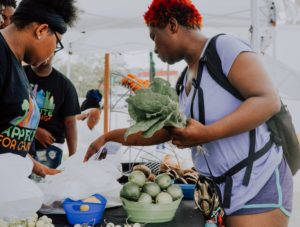
“AFC builds trust and momentum with on-the-ground work that demonstrates to the community it’s in for the long haul.”
“It takes time for behaviors to change,” says LaTasha, not only referencing AFC’s work, but to the habits people form around eating. When LaTasha became a vegetarian, she received pushback from her family and community. However, in the years since, she has watched as family members have slowly come around to her decisions—some even becoming vegans or vegetarians themselves. Knowing first hand that change doesn’t happen overnight, AFC gives the community time it needs to gradually change its own relationship to food. In the meantime, AFC builds trust and momentum with on-the-ground work that demonstrates to the community it’s in it for the long haul.
Changes Worth Making
The room sat empty; cold and full exposed concrete. The bare bones of the space didn’t look like much, but in it the AFC founders saw the potential to build something they never expected to when the organization first launched in 2012: a restaurant. The move was a risk. “We had very little money,” says Michelle. “None of us had restaurant management experience, and we were partnering with a chef who had never run a restaurant before.” Despite the apparent hurdles. AFC powered ahead for one reason: “”The community said they wanted it, and we didn’t see anyone else willing to step up and do it.” So when AFC agreed to take over the space from a local developer in the neighborhood, it immediately turned back to the Northside community to design it.
In 2014, AFC opened the soon-to-be restaurant as a stop on the Northside arts crawl, FLOW. AFC hosted local artists in the space and covered the blank walls with butcher paper people could write on. On the paper, AFC asked people to share what their ideal restaurant would look like: What kind of food would it have? What would the atmosphere look like? What would the space sound and smell like? Throughout the day, nearly 100 people wrote down their ideas. AFC took that feedback and in 2015, Breaking Bread Café opened as the only full-service, sit-down restaurant on West Broadway Avenue.
“People wanted a place where they could kick back, sit down and feel like a community,” says LaTasha. Community members also said they wanted BReaking BRead to be more than just a restaurant; they wanted it to be a place that offered much-needed jobs and training to Northsiders, too. Out of the 30 people employed at the restaurant, most are hired from the community, including a large percentage of people who face barries to employment like incarceration, homelessness, or lack of work history. For many of these employees, chopping vegetables or serving customers comes easy, while skills like conflict resolution and time management don’t.
“People wanted a place where they could kick back, sit down, and feel like community.”
Originally, AFC casually practiced these skills with employees on the job. Yet after running the restaurant for more than two years with an informal approach to workforce development, it realized a more structured format—with classroom time and a dedicated coordinator—would benefit cafe workers more. In 2018, AFC began formalizing its adult training program at Breaking Bread. It started increasing classroom time to allow Breaking Bread employees to study a broader range of soft skills beyond restaurant service and gave them a less pressured environment to learn, away from customers. It also added a program coordinator who serves as a coach and mentor for restaurant staff, giving them a confidant to turn to when they’re in need.
Like the training program, the design of Breaking BRead is an ever-evolving plan that changes in response to the people it serves. In 2018, AFC hosted focus groups through its Community Cooks program, and surveyed both new and regular customers about the changes they’d like to see at the cafe. People said they wanted faster service and quicker dining options when they were on the run.
“The people who are most able to come up with innovative, successful solution to the challenges they face are the people who face those challenges.”
So when Breaking Bread closed for renovations a couple months later, it focused on increasing speed. The restaurant brought a cooler, created a hot bar express line to meet the needs of grab and go customers and redesigned the menu to reduce wait times for sit-down diners.
“People are hungry for something different, and we’re always willing to look at the system and make a change if it’s going to yield better results,” says Michelle. “The people who are most able to come up with innovative, successful solutions to the challenges they face are the people who face those challenges. If you don’t have a particular barrier on a daily basis, you’re less likely to come up with the right solutions.”
AFC gives people the time and space they need to work through their own questions, concerns and ideas about food and healthy eating. Then, when the people say they’re ready to try something new, AFC is right there with them ready to jump.

